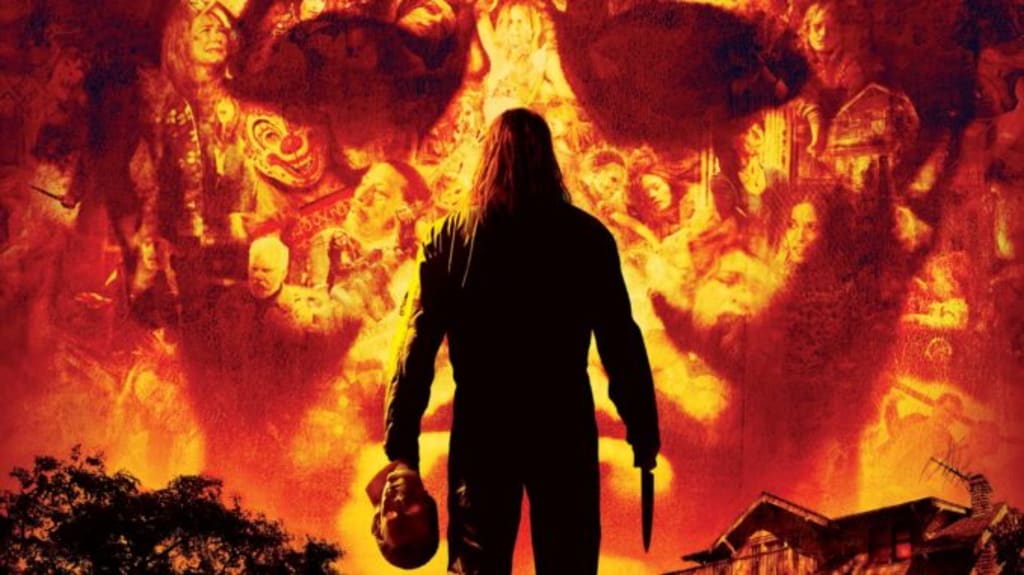
Some time ago that we debated and mostly criticized the idea of a remake of John Carpenter’s horror classic. It was tantamount to heresy that this musician turned filmmaker would remake such a film, by such a beloved director as John Carpenter. The remake opened at #1 with over $26 million and would go on to gross over $80 million worldwide. A financial success it was, the film was blasted by critics. Most of the backlash came less from just the remake aspect and more of the content of the film. Keep in mind critics do not always decide movies. John Carpenter’s Halloween was demolished by critics upon its initial arrival. Now, the original 1978 film is beloved by fans, critics and seen as the foundation for modern horror.
The initial reaction and debut are far over now. How does Rob Zombie’s Halloween hold up ten years later? Yes, we have reviews from many people but one of the most interesting critics for a film is the essence of time itself. You may find yourself watching Sam Raimi’s Spider-Man, and cringing at some of those early special effects now. Then you watch Ridley Scott’s Alien and pick up that the film has symbolism based around sex and rape, things you may not have noticed at an early age. Films, like It’s A Wonderful Life begin their birth as critical failures, only then to become legacies known and beloved by all. I would dare to say Rob Zombie’s Halloween does not have much mileage to offer and this is due to several reasons.
The Style and Tone of the Film
The first being it is a very Rob Zombie film. Many directors will carry a particular style or cover similar themes and ideas, but they can make various, individual, and creative films. For example, a general audience member may not be able to tell that Jurassic Park is from the same director as Schindler’s List. Thematically and visually, there is no obvious clue. The opposite would be someone like Tim Burton, who has a very distinctive style, re-using actors and the same score composer. Visually and style-wise, Rob Zombie’s Halloween is not that different from House of 1000 Corpses or The Devil’s Rejects. You could almost argue it is those movies again, but this time they include John Carpenter's characters. This native-born northerner has this strange fascination with the a-typical quasi redneck/white trash background as some may describe it. It is interesting to note that almost all the men in his films have long, grungy hair as if they all have a spot in a metal band. Either that or they never heard of a hair cut. This also goes for Michael Myers himself.

In addition, this and his other films are filled to the brim with horrific gore, violence, and excessive language. In all honesty, I have no problem with this personally, for I am not offended by these elements. Over time it can become repetitive. Given the mouth on most of his characters, it is difficult to ever empathize with them, as you begin to wonder if Rob Zombie ever had a thesaurus by his side. Granted, explicit language is becoming more common in casual conversation, but Zombie has no filter here. We have the mother dropping the f-bomb left and right in front of her family. Let's not forget the words from William Forsythe's character - "Bitch I will crawl over there and I will skull-fuck the shit out of you!" Meanwhile, workers routinely cuss on the job, even in front of people while on the clock. Hence, why should I feel anything when these characters are killed off?
The violence is especially surprising and shows the director’s odd attraction to it, or shows he is a bit out of touch in his element. John Carpenter’s Halloween had little if any blood. The same can be said for Tobe Hooper’s The Texas Chainsaw Massacre. You can look at other films in other times and genres. Take Christopher Nolan’s The Dark Knight, which surprisingly has a PG-13 rating and the film packs plenty of terror. It came off as a dark film with plenty of violence and spilled little if any blood. The bottom line, blood does not equate to being scary. The combination of these elements makes the film a tough sit to some degree. Even if you are not easily offended and have a strong stomach for this, it can become difficult to watch this on a regular basis.
Time Out of Place
Going off further from Rob Zombie’s style is the time of the film. The film opens in the past, but never truly clarified as to when. Some people have assumed it is 1978, as the release date of the original film. This would explain things like Mrs. Myer’s wardrobe, the use of Don’t Fear The Reaper, and the KISS t-shirt. Later on, the film jumps fifteen years ahead, following the story of Laurie Strode. Now the film is taking place sometime around 1995, right? Again, this is never clarified. It does not help as Rob Zombie continues to push this grungy seventies aesthetic down our throats like with the constant use of Don’t Fear The Reaper, other tunes of that era, or the long-haired metal-band boyfriends. Is the film still in the 1970s, is it in the 1990s or was it fifteen years apart from 2007?

This does not mean the film has a timeless appeal. Instead, it makes for a confusing one due to the will of our director. The 70’s vibe married to the content makes for something of an exploitative grind-house flick. It seems Rob Zombie is making more or less a film for himself, rather than any particular audience. You could count the grind-house audience as his target, but that is a relative niche' crowd. Will the audience of 2007 or today’s audience with little background in this school of cinema be enticed? This was a genre mainly in the 1970s and stayed, save for a few directors and films once in a while. The original Halloween was not even close to grind-house, but more of a modern slasher. Therefore, he is not swinging for the original fans either it would seem.
The Pros over '78
There are some angles Rob Zombie's Halloween works, such as providing a slightly more intricate story and background. Gone with the era of John Carpenter is the notion of a simple evil force of nature villain who kills because he kills. Audiences cannot accept that basic explanation anymore and desire more motivation than just because “he’s evil.” I dare say, using this motivation in a modern, original work would be labeled as lazy writing.
In making Michael Myers a more sympathetic villain with actual psychological problems, we received a more layered villain than what was something of an extra in 1978. In today’s society, we find ourselves usually on the same level as our villains, given they usually come from tragic environments and or backgrounds. Some villains have some tragedy in their life which they seek or desire justice for, meanwhile they wish the same for others. We no longer have naturally evil, but instead evil due to circumstance. This further justifies the use of a psychologist with the character of Dr. Loomis.

If the Michael Myers of the original lore was just a force of unstoppable, natural evil then we may be better off with a priest. Not only that, but Dr. Loomis applies his tools of the trade to the story. We have progressed from the seventies in the field of psychology, hence it makes the case for Michael Myers stronger and firmly grounds the character of Dr. Loomis more. Another interesting premise is our ever-growing distrust of authority figures in modern society. In the beginning, Dr. Loomis plays a healer, but then we see he publishes a book and tours with lectures on the subject of his infamous patient, hence exploiting the situation. There is plenty of distrust of doctors today; hence we have things like self-healing and natural medicine. By the end of the film, the community, the traditional family, and the doctor have failed Michael Myers. What else is left for him? These are strong elements within the film, yet it is not enough to truly prop the film up as a whole.
The film did manage to spawn a sequel, though critically worse and financially sub-par. After the sequel, it seems the Rob Zombie Halloween series died and remains in the grave. Unlike the original, this film was not a jumping-off point for its talent, for Zombie just recycles his regulars. It did not help the horror genre much.
Yes, we received more classic horror remakes but that period died shortly after, with no renewed interest and disgust from fans and critics. One could say this film is another stake in the ground of what critics would cite as "torture porn" flicks such as Saw and Hostel. It would appear with the over-abundance of Saw films, this torture porn is going down by the wayside. In its place are more supernatural films like James Wan's work, clever commentary films like Get Out, or more psychological films like Split. John Carpenter’s Halloween has managed to still chart in the home media sales, but not Rob Zombie’s.
I believe it boils down to the original’s accessibility. People after 1978 know of the talent of Halloween from others and mostly later films. The director had a clearer, simpler story to tell, with a broad audience in mind. His main goal was to scare you. Whereas Zombie wants to scare you but bring up psychology, tell a back story, and drip in his personal tastes of music, fashion, and style. All the while trying too hard to ramp up the language, sex, and gore to be some edgy autuer. Hence, the film remains chronologically displaced for a niche audience and fail to age well with any new fans.
About the Creator
Skyler
Full-time worker, history student and an avid comic book nerd.






Comments
There are no comments for this story
Be the first to respond and start the conversation.